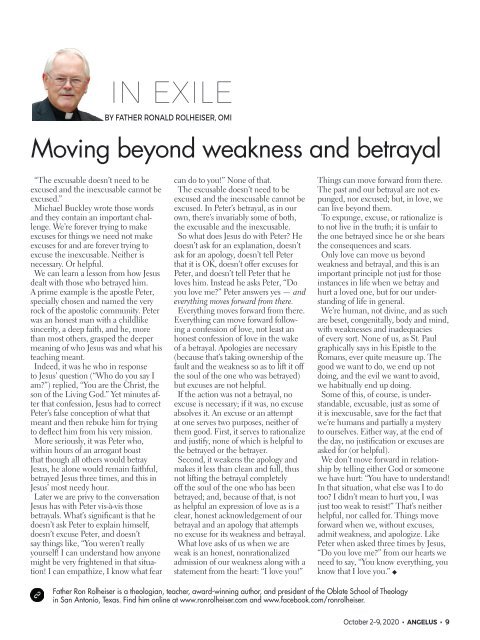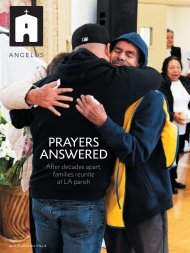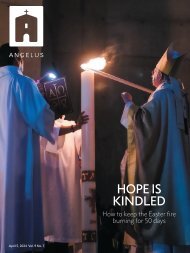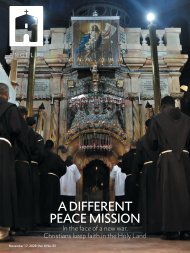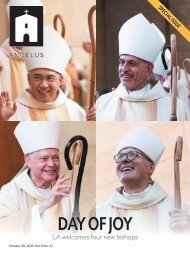Angelus News | October 2-9, 2020 | Vol. 5 No. 25
A statue of the Virgin Mary in the cemetery area of St. Andrew’s Abbey in Valyermo stands as the Bobcat Fire burns in the nearby San Gabriel Mountains Sept. 16. Starting on Page 10, local Catholics — including the monks at St. Andrew’s — share how the same fires that threatened their homes have helped strengthen their faith.
A statue of the Virgin Mary in the cemetery area of St. Andrew’s Abbey in Valyermo stands as the Bobcat Fire burns in the nearby San Gabriel Mountains Sept. 16. Starting on Page 10, local Catholics — including the monks at St. Andrew’s — share how the same fires that threatened their homes have helped strengthen their faith.
You also want an ePaper? Increase the reach of your titles
YUMPU automatically turns print PDFs into web optimized ePapers that Google loves.
IN EXILE<br />
BY FATHER RONALD ROLHEISER, OMI<br />
Moving beyond weakness and betrayal<br />
“The excusable doesn’t need to be<br />
excused and the inexcusable cannot be<br />
excused.”<br />
Michael Buckley wrote those words<br />
and they contain an important challenge.<br />
We’re forever trying to make<br />
excuses for things we need not make<br />
excuses for and are forever trying to<br />
excuse the inexcusable. Neither is<br />
necessary. Or helpful.<br />
We can learn a lesson from how Jesus<br />
dealt with those who betrayed him.<br />
A prime example is the apostle Peter,<br />
specially chosen and named the very<br />
rock of the apostolic community. Peter<br />
was an honest man with a childlike<br />
sincerity, a deep faith, and he, more<br />
than most others, grasped the deeper<br />
meaning of who Jesus was and what his<br />
teaching meant.<br />
Indeed, it was he who in response<br />
to Jesus’ question (“Who do you say I<br />
am?”) replied, “You are the Christ, the<br />
son of the Living God.” Yet minutes after<br />
that confession, Jesus had to correct<br />
Peter’s false conception of what that<br />
meant and then rebuke him for trying<br />
to deflect him from his very mission.<br />
More seriously, it was Peter who,<br />
within hours of an arrogant boast<br />
that though all others would betray<br />
Jesus, he alone would remain faithful,<br />
betrayed Jesus three times, and this in<br />
Jesus’ most needy hour.<br />
Later we are privy to the conversation<br />
Jesus has with Peter vis-à-vis those<br />
betrayals. What’s significant is that he<br />
doesn’t ask Peter to explain himself,<br />
doesn’t excuse Peter, and doesn’t<br />
say things like, “You weren’t really<br />
yourself! I can understand how anyone<br />
might be very frightened in that situation!<br />
I can empathize, I know what fear<br />
can do to you!” <strong>No</strong>ne of that.<br />
The excusable doesn’t need to be<br />
excused and the inexcusable cannot be<br />
excused. In Peter’s betrayal, as in our<br />
own, there’s invariably some of both,<br />
the excusable and the inexcusable.<br />
So what does Jesus do with Peter? He<br />
doesn’t ask for an explanation, doesn’t<br />
ask for an apology, doesn’t tell Peter<br />
that it is OK, doesn’t offer excuses for<br />
Peter, and doesn’t tell Peter that he<br />
loves him. Instead he asks Peter, “Do<br />
you love me?” Peter answers yes — and<br />
everything moves forward from there.<br />
Everything moves forward from there.<br />
Everything can move forward following<br />
a confession of love, not least an<br />
honest confession of love in the wake<br />
of a betrayal. Apologies are necessary<br />
(because that’s taking ownership of the<br />
fault and the weakness so as to lift it off<br />
the soul of the one who was betrayed)<br />
but excuses are not helpful.<br />
If the action was not a betrayal, no<br />
excuse is necessary; if it was, no excuse<br />
absolves it. An excuse or an attempt<br />
at one serves two purposes, neither of<br />
them good. First, it serves to rationalize<br />
and justify, none of which is helpful to<br />
the betrayed or the betrayer.<br />
Second, it weakens the apology and<br />
makes it less than clean and full, thus<br />
not lifting the betrayal completely<br />
off the soul of the one who has been<br />
betrayed; and, because of that, is not<br />
as helpful an expression of love as is a<br />
clear, honest acknowledgement of our<br />
betrayal and an apology that attempts<br />
no excuse for its weakness and betrayal.<br />
What love asks of us when we are<br />
weak is an honest, nonrationalized<br />
admission of our weakness along with a<br />
statement from the heart: “I love you!”<br />
Things can move forward from there.<br />
The past and our betrayal are not expunged,<br />
nor excused; but, in love, we<br />
can live beyond them.<br />
To expunge, excuse, or rationalize is<br />
to not live in the truth; it is unfair to<br />
the one betrayed since he or she bears<br />
the consequences and scars.<br />
Only love can move us beyond<br />
weakness and betrayal, and this is an<br />
important principle not just for those<br />
instances in life when we betray and<br />
hurt a loved one, but for our understanding<br />
of life in general.<br />
We’re human, not divine, and as such<br />
are beset, congenitally, body and mind,<br />
with weaknesses and inadequacies<br />
of every sort. <strong>No</strong>ne of us, as St. Paul<br />
graphically says in his Epistle to the<br />
Romans, ever quite measure up. The<br />
good we want to do, we end up not<br />
doing, and the evil we want to avoid,<br />
we habitually end up doing.<br />
Some of this, of course, is understandable,<br />
excusable, just as some of<br />
it is inexcusable, save for the fact that<br />
we’re humans and partially a mystery<br />
to ourselves. Either way, at the end of<br />
the day, no justification or excuses are<br />
asked for (or helpful).<br />
We don’t move forward in relationship<br />
by telling either God or someone<br />
we have hurt: “You have to understand!<br />
In that situation, what else was I to do<br />
too? I didn’t mean to hurt you, I was<br />
just too weak to resist!” That’s neither<br />
helpful, nor called for. Things move<br />
forward when we, without excuses,<br />
admit weakness, and apologize. Like<br />
Peter when asked three times by Jesus,<br />
“Do you love me?” from our hearts we<br />
need to say, “You know everything, you<br />
know that I love you.” <br />
Father Ron Rolheiser is a theologian, teacher, award-winning author, and president of the Oblate School of Theology<br />
in San Antonio, Texas. Find him online at www.ronrolheiser.com and www.facebook.com/ronrolheiser.<br />
<strong>October</strong> 2-9, <strong>2020</strong> • ANGELUS • 9


